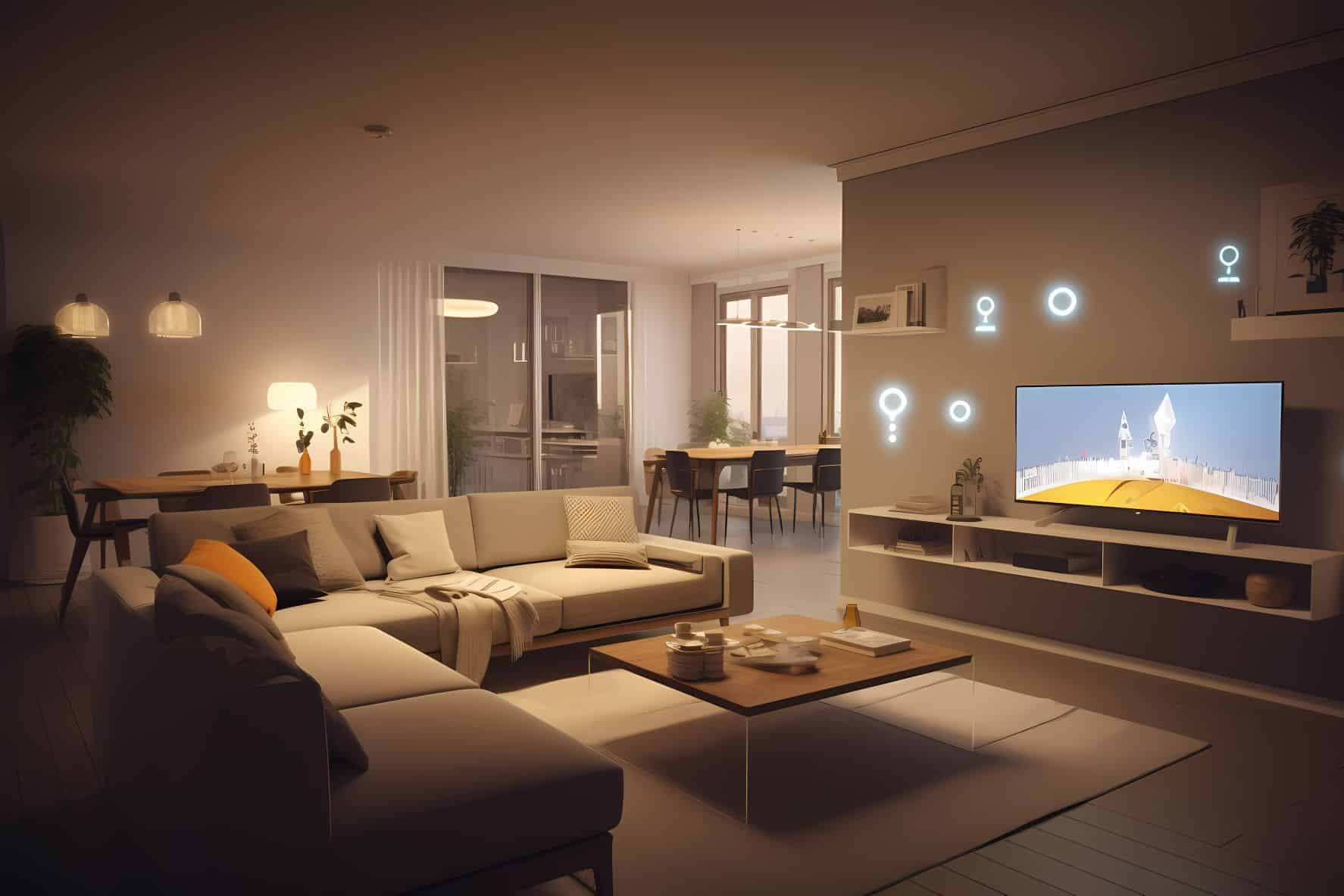Imagine a world where your living environment is not just a physical space, but a smart and responsive ecosystem that enhances your daily life. This is the rise of smart spaces, where technology and innovation are transforming our living environments in ways we never thought possible.
Smart spaces are more than just the latest trend in home automation; they represent a fundamental shift in how we interact with our surroundings. From intelligent lighting systems that adjust based on our preferences, to voice-activated virtual assistants that control our appliances, smart spaces are revolutionizing the way we live, work, and play.
The integration of smart technology has led to the rise of smart spaces, transforming our living environments for the better. From voice-controlled lighting to intelligent thermostats, these advancements enhance convenience and efficiency, making our homes more responsive to our needs. Smart spaces optimize energy consumption, improve security measures, and provide seamless connectivity. With the ability to automate tasks and personalize settings, smart spaces offer a more comfortable and connected living experience.

The Rise of Smart Spaces: Revolutionizing Our Living Environments
In recent years, we have witnessed a remarkable transformation in our living environments with the rise of smart spaces. Smart spaces, also known as connected spaces, refer to physical environments that have been integrated with advanced technologies to enhance the quality of life and improve efficiency. These spaces incorporate various smart devices, sensors, and internet connectivity to create an intelligent ecosystem that responds to the needs of its occupants.
With the increasing ubiquity of the Internet of Things (IoT) and the advancements in artificial intelligence (AI), smart spaces have become a reality, shaping the way we live, work, and interact with our surroundings. From smart homes and offices to smart cities and transportation systems, these intelligent spaces are revolutionizing our daily lives in countless ways.
To understand the impact of smart spaces and the potential they hold, it is vital to explore the various aspects of this emerging trend. This article delves into the transformative power of smart spaces, the benefits they offer, and the challenges they pose. By examining the different applications and implications of smart spaces, we can gain valuable insights into the future of our living environments.
The Benefits of Smart Spaces
The integration of smart technologies into our living environments brings forth a multitude of benefits that enhance our daily lives. Here are some key advantages of smart spaces:
- Increased convenience and comfort: Smart homes, for example, offer automated systems for lighting, temperature control, and security, providing convenience and comfort to occupants.
- Improved energy efficiency: Smart spaces optimize energy consumption by using sensors and AI algorithms to adjust lighting, heating, and cooling based on occupancy and environmental conditions.
- Enhanced safety and security: Smart spaces incorporate advanced security systems, such as smart locks and surveillance cameras, to protect occupants and their belongings.
- Streamlined operations and maintenance: Connected spaces enable remote monitoring and control, allowing for efficient management of infrastructure, utilities, and maintenance tasks.
- Personalized experiences: Smart spaces utilize data and AI to tailor experiences and services based on individual preferences, whether it is personalized lighting, music playlists, or shopping recommendations.
These benefits demonstrate how smart spaces improve our quality of life by creating environments that are intuitive, efficient, and responsive to our needs and preferences.
The Applications of Smart Spaces
The concept of smart spaces extends beyond the boundaries of our homes. Here are some notable applications of smart spaces:
1. Smart Homes
Smart homes are one of the most widely recognized applications of smart spaces. In a smart home, various devices are interconnected and can be controlled remotely through a smartphone or voice commands. From smart thermostats and lighting systems to voice-activated assistants and security systems, smart homes offer a seamless and integrated living experience.
With smart home technology, homeowners can automate routine tasks, monitor energy usage, and enhance security. Smart homes also enable remote monitoring and control, allowing occupants to adjust settings and receive alerts from anywhere in the world.
Moreover, smart homes promote energy conservation by ensuring efficient use of resources. For example, automated lighting systems can adjust brightness based on natural light levels or occupancy, reducing energy wastage.
As smart home technology becomes more accessible and affordable, the adoption of smart homes is expected to increase significantly, transforming the way we live and interact with our domestic spaces.
2. Smart Offices
Smart office spaces leverage technology to create productive and efficient work environments. These spaces integrate various systems and devices to streamline operations and enhance occupant experience.
One example of smart office technology is sensor-based lighting systems. These systems adjust lighting levels based on occupancy and natural light, improving energy efficiency and reducing eye strain for employees.
Smart offices also prioritize occupant comfort by monitoring and controlling temperature and air quality. With smart HVAC systems, office spaces can adapt to individual preferences while optimizing energy consumption.
Moreover, smart offices provide seamless connectivity and collaboration tools, such as video conferencing systems, cloud-based document storage, and smart whiteboards, enabling enhanced productivity and communication.
By leveraging smart technologies, offices can create more efficient and sustainable workspaces that foster employee well-being and increase productivity.
3. Smart Cities
Smart cities are built on the principles of connectivity and sustainability. These cities leverage technology and data to enhance the quality of life for residents, improve resource management, and optimize urban infrastructure.
One of the key components of a smart city is an intelligent transportation system. These systems utilize real-time data and sensors to manage traffic flow, optimize public transportation routes, and reduce congestion.
Additionally, smart cities integrate smart grids to efficiently manage energy distribution, reducing waste and ensuring reliable power supply. They also incorporate smart waste management systems to optimize garbage collection and recycling processes.
Moreover, smart cities prioritize sustainability by implementing eco-friendly initiatives, such as green buildings, renewable energy sources, and efficient water management systems. These initiatives aim to create environmentally responsible urban spaces that minimize their carbon footprint.
The development of smart cities is driven by the need for efficient resource utilization, improved infrastructure, and enhanced quality of life for citizens.
The Challenges and Considerations of Smart Spaces
While smart spaces offer significant advantages, they also present certain challenges and considerations that need to be addressed:
1. Privacy and Security
As smart spaces incorporate advanced technologies and collect vast amounts of data, privacy and security become critical concerns. Data breaches, hacking attempts, and unauthorized access pose risks to the personal information and safety of individuals. It is crucial to implement robust security measures and privacy protocols to mitigate these risks and protect sensitive data.
2. Interoperability and Compatibility
Smart spaces often involve multiple devices and systems from different manufacturers, which can lead to compatibility issues and limitations in interoperability. Consistent standards and protocols need to be established to ensure seamless integration and communication between different smart devices and platforms.
3. Affordability and Accessibility
While smart technologies offer immense potential, their high costs may hinder widespread adoption, especially in lower-income communities. Addressing affordability and ensuring accessibility for all segments of society is crucial for equitable access to the benefits of smart spaces.
4. Data Privacy and Ethics
Smart spaces generate vast amounts of data about individuals and their behaviors. It is essential to establish transparent policies and ethical guidelines for data collection, usage, and sharing. Respecting privacy rights and ensuring consent are crucial considerations to build trust and promote responsible use of data.
By addressing these challenges and considerations, the potential of smart spaces can be maximized while ensuring the well-being and rights of individuals.
The Future of Smart Spaces
The rise of smart spaces is an ongoing journey of innovation and transformation. As technology continues to evolve, we can expect the following trends and developments in the future:
1. Integration of AI and Machine Learning
Artificial intelligence and machine learning will play a significant role in smart spaces, enabling predictive analytics, personalized experiences, and autonomous decision-making. These technologies will further enhance the efficiency, sustainability, and responsiveness of smart spaces.
2. Expansion of Smart Cities
Smart city initiatives will continue to expand globally, integrating advanced technologies and data-driven solutions to address urban challenges and improve the lives of citizens. The development of smart transportation systems, energy grids, and environmental management will shape the cities of the future.
3. Enhanced Personalization and Hyperconnectivity
Smart spaces will become increasingly personalized, adapting to individual preferences and providing tailored experiences. The hyperconnectivity of devices and systems will enable seamless communication and interaction between different smart spaces, offering a cohesive and integrated environment.
By leveraging emerging technologies and addressing challenges, the future of smart spaces holds immense potential to create sustainable, efficient, and inclusive living environments.
As society evolves and embraces the possibilities of smart spaces, it is crucial to prioritize ethical considerations, privacy rights, and equitable access to ensure that the benefits of this transformation are enjoyed by all.
To learn more about the transformative power of smart spaces, explore the latest trends and innovations in this field. The future of our living environments is being shaped by the rise of smart spaces.
The Rise of Smart Spaces: Transforming Our Living Environments – Key Takeaways
- Smart spaces refer to environments that are equipped with technology to enhance functionality and convenience.
- Smart home devices, such as voice assistants and smart thermostats, are becoming increasingly common.
- Smart spaces can improve energy efficiency, security, and overall quality of life.
- Integration between different devices and systems is key to creating a seamless and connected smart space.
- The rise of smart spaces presents exciting opportunities for innovation and technological advancements.

The rise of smart spaces is revolutionizing our living environments by integrating technology into every aspect of our daily lives. From smart homes to smart cities, these intelligent spaces are transforming how we live, work, and interact.
With the advancement of smart devices and the Internet of Things (IoT), our living spaces are becoming more connected and efficient. We can control our lights, thermostats, and appliances with a simple voice command or a touch of a button. Smart spaces are enabling us to create personalized environments that adapt to our needs and preferences.
Moreover, smart spaces are enhancing safety and security by integrating surveillance systems, smart locks, and facial recognition technology. These advancements not only protect our homes but also provide peace of mind for homeowners.
In addition, smart spaces are improving energy efficiency and sustainability. Energy management systems and smart sensors help optimize energy usage and reduce waste, resulting in lower utility bills and a smaller carbon footprint.
Overall, the rise of smart spaces is transforming our living environments into intelligent, interconnected, and sustainable spaces that enhance our quality of life.


